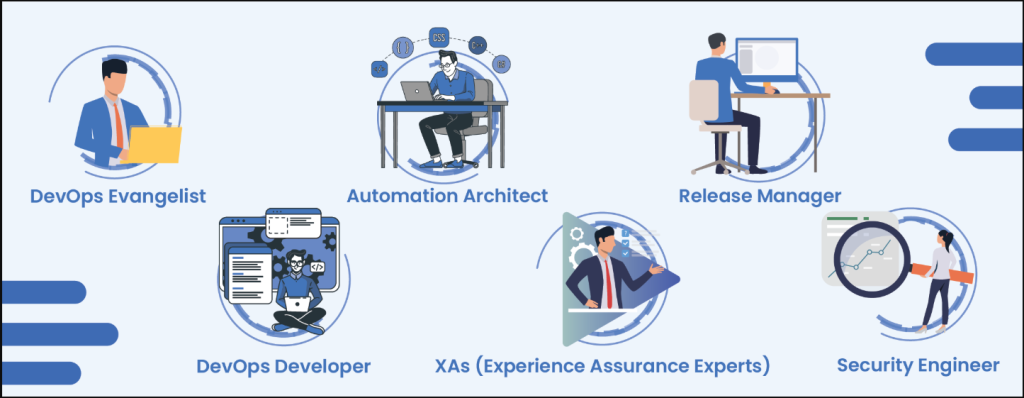Upgrade & Secure Your Future with DevOps, SRE, DevSecOps, MLOps!
We spend hours on Instagram and YouTube and waste money on coffee and fast food, but won’t spend 30 minutes a day learning skills to boost our careers.
Master in DevOps, SRE, DevSecOps & MLOps!
Learn from Guru Rajesh Kumar and double your salary in just one year.

A DevOps Engineer plays a critical role in bridging the gap between software development and IT operations. Their primary goal is to streamline the software development lifecycle (SDLC) by implementing automation, improving collaboration, and ensuring seamless deployment and monitoring of applications. DevOps Engineers focus on continuous integration (CI), continuous delivery (CD), infrastructure automation, and monitoring to enable faster and more reliable software releases.
In this post, we will explore the key job responsibilities of a DevOps Engineer, their major roles, and the essential skills required to excel in this field.
1. Building and Managing CI/CD Pipelines
Major Responsibilities:
- Continuous Integration (CI):
- A DevOps Engineer is responsible for setting up CI pipelines that automate code integration, testing, and validation before deployment. This helps detect and resolve bugs early in the development cycle.
- Continuous Deployment (CD):
- DevOps Engineers create CD pipelines to automate the deployment process, ensuring that code is delivered to production environments quickly and with minimal human intervention.
- Automation of Software Releases:
- By using tools like Jenkins, GitLab CI/CD, CircleCI, and Travis CI, DevOps Engineers automate the build, test, and release cycle, reducing manual work and increasing deployment speed.
- Version Control and Code Management:
- They work with version control systems like Git and platforms like GitHub, GitLab, or Bitbucket to manage source code repositories and ensure seamless code collaboration.
2. Infrastructure Automation and Configuration Management
Major Responsibilities:
- Infrastructure as Code (IaC):
- DevOps Engineers use IaC tools like Terraform, Ansible, CloudFormation, and Puppet to define, provision, and manage infrastructure through code instead of manual configurations.
- Automating Cloud and Server Deployments:
- They manage cloud-based infrastructures using platforms like AWS, Microsoft Azure, Google Cloud, and Kubernetes, ensuring that applications are deployed and scaled efficiently.
- Containerization and Orchestration:
- DevOps Engineers implement containerization with tools like Docker and manage container orchestration with Kubernetes, Amazon ECS, and OpenShift to ensure consistent environments across development, testing, and production.
- Configuration Management:
- They use tools like Chef, Ansible, and SaltStack to automate configuration changes, ensuring system consistency and reducing configuration drift.

3. Monitoring, Logging, and Incident Management
Major Responsibilities:
- Application and Infrastructure Monitoring:
- DevOps Engineers implement real-time monitoring using tools like Prometheus, Grafana, Datadog, and New Relic to track system performance and detect anomalies.
- Log Management and Analysis:
- They configure centralized logging solutions such as ELK Stack (Elasticsearch, Logstash, Kibana), Splunk, and Graylog to collect and analyze logs for troubleshooting and security purposes.
- Incident Response and Root Cause Analysis:
- DevOps Engineers work closely with Site Reliability Engineers (SREs) and IT teams to respond to system failures, conduct post-mortem analysis, and implement preventive measures.
- Security Monitoring and Compliance:
- They integrate security monitoring tools such as AWS Security Hub, Aqua Security, and Snyk into DevOps workflows to detect security vulnerabilities and ensure compliance with GDPR, HIPAA, and PCI-DSS standards.
4. Collaboration Between Development and Operations Teams
Major Responsibilities:
- Breaking Down Silos:
- DevOps Engineers promote collaboration between development, IT operations, security, and testing teams to ensure that applications are developed, deployed, and monitored effectively.
- Implementing DevSecOps:
- They integrate security best practices into DevOps pipelines, ensuring that security is incorporated early in the development process rather than as an afterthought.
- Ensuring System Reliability:
- By working with SRE teams, DevOps Engineers improve service reliability, availability, and scalability of applications.
- Facilitating Agile Development:
- DevOps Engineers enable agile development by shortening release cycles, increasing deployment frequency, and reducing time-to-market for new features.
5. Performance Optimization and Scalability
Major Responsibilities:
- Optimizing System Performance:
- DevOps Engineers continuously monitor application performance, infrastructure utilization, and resource consumption to optimize efficiency.
- Scaling Applications and Infrastructure:
- They use auto-scaling mechanisms in cloud environments (e.g., AWS Auto Scaling, Kubernetes Horizontal Pod Autoscaler) to dynamically allocate resources based on demand.
- Database Management and Optimization:
- DevOps Engineers work with databases like MySQL, PostgreSQL, MongoDB, and Cassandra to ensure efficient query performance, backups, and high availability.
- Cost Optimization in Cloud Environments:
- They implement cost-saving strategies such as right-sizing cloud instances, implementing reserved instances, and optimizing storage utilization to reduce infrastructure costs.
6. Essential Skills and Tools for DevOps Engineers
Major Features:
- Technical Skills:
- Scripting & Automation: Proficiency in Bash, Python, PowerShell, or Go for automation.
- Cloud Platforms: Experience with AWS, Azure, Google Cloud, or hybrid cloud solutions.
- CI/CD Pipelines: Hands-on experience with Jenkins, GitLab CI/CD, and CircleCI.
- Containerization & Orchestration: Expertise in Docker and Kubernetes.
- Soft Skills:
- Collaboration & Communication: Working with cross-functional teams.
- Problem-Solving: Debugging and optimizing systems for high availability.
- Adaptability: Keeping up with emerging DevOps trends and technologies.
- Popular DevOps Tools:
- Infrastructure Automation: Terraform, Ansible, CloudFormation.
- Monitoring & Logging: Prometheus, Grafana, ELK Stack.
- Version Control: Git, GitHub, Bitbucket.
- Security & Compliance: Snyk, Aqua Security, AWS Security Hub.
The Evolving Role of a DevOps Engineer
The DevOps Engineer role is crucial in modern software development, where speed, reliability, and automation are key to delivering high-quality applications. By integrating CI/CD pipelines, infrastructure automation, monitoring tools, and collaboration practices, DevOps Engineers ensure that software development and operations work together seamlessly.
In today’s fast-paced IT landscape, organizations rely on DevOps Engineers to improve deployment efficiency, enhance security, and optimize performance. As technology continues to evolve, mastering DevOps methodologies and tools will be essential for anyone pursuing a career in DevOps engineering.

 Starting: 1st of Every Month
Starting: 1st of Every Month  +91 8409492687 |
+91 8409492687 |  Contact@DevOpsSchool.com
Contact@DevOpsSchool.com